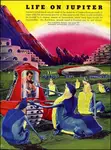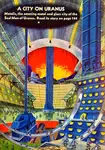mars quiz:
tale-to-author
For each excerpt, you gain 2 points for giving the author and the title of the story; 1 point for giving just one of them.
Email your responses to me at heritageofdreams@aol.com.
The right answers will appear on the Author-To-Tale page.
18th january 2017 excerpt 1:
...His ship seemed to stand still in the void, except that gradually Mars became larger. At a million miles, it was a great, glowing ball as big as the Moon seen from Earth; and it grew like an expanding balloon until its dark bulk filled half the sky, and lost its redness.
Continents took form, mountains, seas, incredible gorges, rock-strewn and barren stretches of flat land. Grimmer grew the picture, deadlier every forsaken aspect of that gnarled old planet. Mars, seen through an electric telescope at thirty thousand miles, was like a too-old human being, withered, bony, ugly, cold-looking, drooling with age, enormously repellent.
The dark area that was Mare Cimmerium showed as a fanged, terrible sea. Silent, almost tideless, the waters lay under the eternal blue-dark skies; but no ship could ever breast those placid waters. Endless miles of jagged rocks broke the surface. There were no patterns, no channels, simply the sea and the protruding rock...
>> Answer in Author-To-Tale
answer to excerpt 2:
...Thikar's green face darkened with passion and his hand strayed towards the atom pistol at his belt.
"Nobody can talk to me like that," the big Jovian said thickly.
Quorn's black eyes narrowed to pinpoints and his own arm tensed clawlike above the pistol in his belt-holster.
"Do you feel rebellious, Thikar?" he purred tigerishly. "Would you like to argue the matter with me? If so - go right ahead!"
Johnny Kirk saw Thikar's sullen eyes waver and drop before the deadly menace in the mixed breed's face. The Jovian was outfaced.
The girl beside Ul Quorn intervened. She was pure Martian in beauty, with midnight hair and slumbrous eyes and smooth red features of sultry loveliness. In her tight green bodice and slit skirt, she was lithe and quick as a sand-cat of her native world.
"We'll get nowhere by quarreling with each other," she told Ul Quorn anxiously in her low, husky voice...
This is from Edmond Hamilton's The Magician of Mars (1941, 1968).
21st january 2017 excerpt 3:
...Harrigan blundered into the cave by pure luck. He knew nothing about Mars or its deserts except what the Company put in its handbook, and that was damn little. He was a big man and a strong man, born in the mountains with a more than ordinary tolerance for altitude, and he had had to spend less than a week in the dome before they shifted him to the new post in the eastern Sabaeus. He did what he was told and no more than he was told, laid away his pay every week in anticipation of one almighty spree when they brought him in at the next opposition, and had nothing but contempt for the native Martians. Grekka they were called, and that was all he knew or cared about them. To him they looked like animals and they were animals, in spite of the fact that they could talk and build houses and kept herds of peg-legged monstrosities which seemed to serve as cattle. Hell - parrots could talk and ants kept cattle!
>> Answer in Author-To-Tale
answer to excerpt 4:
The
City was a city all right, and, to a point, self-sustaining. But,
eventually, the rarest butterflies of metal gossamer, gaseous oil and
fiery dream sank to earth, the machines that repaired the machines that
repaired the machines grew old, ill and damaging of themselves. Here
then was the bestial garage, the slumberous elephant's bone yard where
the aluminium dragons crawled rusting out their souls, hopeful of one
live person left among so much active but dead metal, that person to put
things right. One God of the machines to say, you Lazarus-elevator,
rise up! You hovercraft, be reborn! And anoint them with leviathan
oils, tap them with magical wrench and send them forth to almost eternal
lives in and on the air and above the quicksilver paths...
This is from The Lost City of Mars (1966). This Bradbury story originally appeared in Playboy, and was reprinted in The Book of Mars (1971), edited by Jane Hipolito and Willis E McNelly.
5th february 2017 excerpt 5:
"I must warn you that the drug is not wholly reliable," said the drum-chested, mummy-lean keeper of the dive. His voice boomed like the croaking of some gigantic frog, that had contrived to shape itself into human vocables. "Before and after it, you must keep your mind fixed undeviatingly on whatever events you have desired to re-live. Otherwise you may re-live happenings which you have wished to forget."
"In other words, the clock is turned back? I have heard that the drug creates a complete illusion of reality - sight, hearing, taste and touch."
"Yes, as you earthmen understand illusion - and reality. When the mnemoka has taken full effect, you will have all the sensation of experiencing certain past events as if they were part of the present..."
Answer in Author-To-Tale.
answer to question 6:
The question was, how do we know that John Carter, Warlord of Mars, attended the 1893 Chicago World's Fair?
We are told that he thinks back to it when Fal Sivas, the inventor of a mechanical brain which responds to his thought waves, wants to know whether John Carter can influence it too.
"...let us see what you can do."
I had no intention of letting Fal Sivas know that I could operate his invention, if he did not already know it; and so I tried to keep my thoughts as far from it as possible. I recalled football games that I had seen, a five-ring circus, and the Congress of Beauties on the Midway of the 1893 Chicago Worlds's Fair. In fact, I tried to think of everything under the sun rather than Fal Sivas and his mechanical brain.
- Edgar Rice Burroughs, Swords of Mars (1934, 1936)
29th march 2017 excerpt 7:
...Long ago, a human race with a highly advanced civilization and great scientific powers had flourished in this part of Mars. They were known even to have achieved space travel and to have explored other worlds. But with their passing, this achievement had been lost.
That ancient Martian people had had wonderful mechanical aptitude. They delighted in constructing ever more complex labor-saving machines to spare them the necessity of any drudgery. They had called themselves the Machine-masters because all labor in their metropolis was eventually performed by imperishable, self-powered machines that worked in fixed, unalterable routines.
But the Machine-masters, with no toil or struggle to stimulate their energies, soon fell into decadence. There was no need to worry about food. It was all raised and brought to them by machines. Their clothing was made by other machines. They had not even any enemies to fear. Around their city, mindless machine guards patrolled which would instantly slay any intruder.
So the Machine-masters, sinking further into decadence, had finally passed away. But their wondrous Machine City remained... Everyone in the System had heard of the Machine City. But few had ever dared even to approach it, so formidable were the great mechanical guards that still protected the place...
Answer in Author-To-Tale.
answer to excerpt 8:
Recent researches into the surviving documents of the Old Race of Mars have provided insights into the morals and manners of these quaint, extinct creatures who at one time were the only outpost of intelligent life in our Solar System. Three-fingered, cleft of chin, addicted to carrying umbrellas in the early stages of their long history, these Martian humanoids have represented a considerable mystery, both as to their way of life and its abrupt and disastrous end - so recently in time.
Our new studies make it possible to understand many of the questions, including the answer to the greatest question of all: What killed the Martian race in its prime, only some four centuries ago?
As we know, Martian civilization, unlike that of Earth, arose in its southern hemisphere. This had far-reaching consequences. As on Earth an entire mythology grew around the North Star and its attendant circumpolar constellations, so it was on Mars, with its clearer air and consequent sharper view of the Milky Way and other nebulosities.
On Mars, of course, it was the South Star that was the "hub" of their heaven - rather, would have been, had there been a "South Star".
Unfortunately, and the Martian South Celestial Pole there is no star of significant magnitude. The pole itself is located roughly midway between the quite unimportant stars Mu Velae and Iota Carinae, in a tentacled patch of the Milky Way shaped rather like a three-fingered hand with opposed thumb. The pole itself is located near the palm of the hand.
This resemblance to a hand had unfortunate effects on the Martian mythos...
This is from The Martian Star-Gazers by Frederick Pohl, which first appeared in Galaxy in 1962 and then in The Best of Sci-Fi 4, ed. Judith Merril (1963).
11th may 2017 excerpt 9:
...Now Marvin was able to take stock of himself. He looked at his legs, which were long and spindly. There was no knee joint; instead, the leg was pivoted at the ankle, shin, midthigh, and upper thigh. He walked, and admired the fluid motion of his movements. His arms were slightly thicker than his legs, and his double-jointed hands had three fingers and two opposable thumbs. He could bend and twist these in a surprising number of ways.
He was dressed in black shorts and a white jumper. His chest-prop was folded neatly and covered with an embroidered leather case. He was amazed at how natural it all seemed.
And yet, it was not surprising. The ability of intelligent creatures to accommodate to new environments was what made Mindswap possible. And the Martian frame, despite certain striking morphological and sensory differences, was easy to get used to, unlike some of nature's more perverse creations.
Flynn was musing on this when he heard a door open behind him. He turned and saw a Martian standing in front of him, dressed in a government uniform of green and gray stripes. The Martian had reversed his feet in greeting, and Marvin quickly responded in kind...
Answer in Author-To-Tale.
answer to excerpt 10:
Mars had thin but breathable
air, Gillen reported. It was an arid world of red deserts with oases
of gray vegetation wherever there were underground springs or
water-courses. There were Martians of some intelligence moving in
nomadic groups from oasis to oasis. They were man-like beings with
stilt-like legs and arms, with huge bulging chests and bulbous heads
covered with light fur. Gillen said the Martian groups or tribes fought
some among themselves with spears and like weapons, but that they
welcomed him as a friend. He reported signs of large mineral and
chemical deposits before he left Mars...
This is from A Conquest of Two Worlds by Edmond Hamilton (Wonder Stories, February 1932).
› Mars Quiz - Tale-To-Author





































